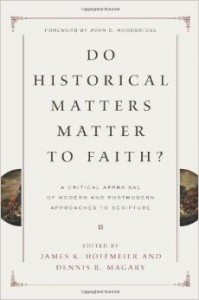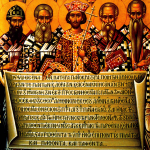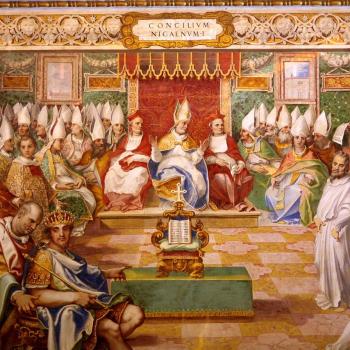 Okay, okay. I do need to preface with this:
Okay, okay. I do need to preface with this:
Irenaeus (ca. 130/140-ca. 200) never used the term “inerrancy.” It’s probably not even fair to call him an “inerrantist.” The word, and many nuances of it, are of recent descent and are influenced by modern debates over the truthfulness of Scripture, especially in relationship to textual and scientific criticism and the formation of the Canon. So the difference is substantial in detail, but the spirit of the idea is clearly there.
That said, the point here is this: the idea that Scripture is without error isn’t something fundamentalists cooked up in a lab a century ago. Inerrancy is not a view of Scripture held by close-minded neanderthals, either. Rather, it’s an idea that says nothing more than this: (1) if you were able to sit down with the writers of Scripture when they penned their books, you’d find that they painstakingly chose to tell the truth, and (2) there is another Author of Scripture, who ensures the accuracy of Scripture and its transmission through the millennia. Yes, there are genres; no, there are not errors.
Irenaeus, in Against Heresies, lays out a very explicit inerrancy-like view of Scripture when battling the Gnostics who taught the errancy of Scripture. In Do Historical Matters Matter to Faith?, Michael A. G. Haykin’s essay explains Irenaeus’s view via engagement with several primary texts (pp. 135-147):
1. “Irenaeus based the fidelity of the apostolic writings upon the absolute truthfulness of the Lord Jesus Christ and the conviction that truth and falsehood are polar opposites. … [By extension of Christ’s embodiment of truth] the quality of absolute truthfulness [is] predicated of the authors of the books of the Old Testament, since the Spirit who spoke through the apostles also spoke through the Old Testament writers. Thus the Scriptures form a harmonious whole.”
2. “A second major emphasis of Irenaeus’s bibliology is the unity of the Testaments and, by extension, the unity of the history of salvific work. … There is therefore a common theme that informs both Old Testament prophets and the New Testament apostles: Christ.”
One thing that’s irrefutable when reading the Fathers on Scripture—they saw no place for the Bible having errors, contradictory statements, or even incidental falsehoods. Haykin argues that this framework was the foundation for Irenaeus’s dispute with Gnostics and others over the truthfulness and sufficiency of Scripture. As Haykin notes via Norbert Brox: “[In] Irenaeus this principle stands at the the beginning [of his thought]: that the Bible is in every respect perfect and sufficient.”
















